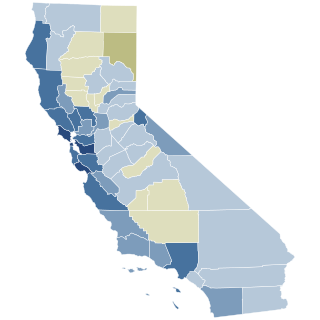
The Oregon Constitution is the governing document of the U.S. state of Oregon, originally enacted in 1857. As amended the current state constitution contains eighteen sections, beginning with a bill of rights. This contains most of the rights and privileges protected by the United States Bill of Rights and the main text of the United States Constitution. The remainder of the Oregon Constitution outlines the divisions of power within the state government, lists the times of elections, and defines the state boundaries and the capital as Salem.
In the politics of the United States, the process of initiatives and referendums allow citizens of many U.S. states to place legislation on the ballot for a referendum or popular vote, either enacting new legislation, or voting down existing legislation. Citizens, or an organization, might start an initiative to gather a predetermined number of signatures to qualify the measure for the ballot. The measure is placed on the ballot for the referendum, or actual vote.
The current Constitution of the State of Maryland, which was ratified by the people of the state on September 18, 1867, forms the basic law for the U.S. state of Maryland. It replaced the short-lived Maryland Constitution of 1864 and is the fourth constitution under which the state has been governed. It was last amended in 2022.

The Constitution of the State of Tennessee defines the form, structure, activities, character, and fundamental rules of the U.S. State of Tennessee.

Prior to the Supreme Court's decision in Obergefell v. Hodges (2015), U.S. state constitutional amendments banning same-sex unions of several different types passed, banning legal recognition of same-sex unions in U.S. state constitutions, referred to by proponents as "defense of marriage amendments" or "marriage protection amendments." These state amendments are different from the proposed Federal Marriage Amendment, which would ban same-sex marriage in every U.S. state, and Section 2 of the Defense of Marriage Act, more commonly known as DOMA, which allowed the states not to recognize same-sex marriages from other states. The amendments define marriage as a union between one man and one woman and prevent civil unions or same-sex marriages from being legalized, though some of the amendments bar only the latter. The Obergefell decision in June 2015 invalidated these state constitutional amendments insofar as they prevented same-sex couples from marrying, even though the actual text of these amendments remain written into the state constitutions.

Ballot Measure 2 of 1998 is a ballot measure, since ruled unconstitutional, that added an amendment to the Alaska Constitution that prohibited the recognition of same-sex marriage in Alaska. The Ballot measure was sparked by the lawsuit filed by Jay Brause and Gene Dugan, after the two men were denied a marriage license by the Alaska Bureau of Vital Statistics. In Brause v. Bureau of Vital Statistics, 1998 WL 88743, the Alaska Superior Court ruled that the state needed compelling reason to deny marriage licenses to same-sex couples and ordered a trial on the question. In response, the Alaska Legislature immediately proposed and passed Resolution 42, which became what is now known as Ballot Measure 2. Ballot Measure 2 passed via public referendum on November 3, 1998, with 68% of voters supporting and 32% opposing. The Bause case was dismissed following the passage of the ballot measure.

On November 4, 2008, the U.S. state of Oregon held statewide general elections for three statewide offices, both houses of the Oregon Legislative Assembly, and twelve state ballot measures. The primary elections were held on May 20, 2008. Both elections also included national races for President of the US, US Senator, and US House Representatives. Numerous local jurisdictions — cities, counties, and regional government entities — held elections for various local offices and ballot measures on these days as well.

Oregon Ballot Measure 54 (2008) or House Joint Resolution is a legislatively referred constitutional amendment that removed provisions relating to qualifications of electors for school district elections. The measure is a technical fix designed to remove inoperative provisions in the Oregon Constitution which barred those under 21 from voting in school board elections and required voters to be able to pass a literacy test to vote in school district elections. This measure appeared on the November 4, 2008 general election ballot in Oregon. It was passed by voters, receiving 72.59% of the vote.

Proposition 8, a law enacted by California voters on 8 June 1982 by the initiative process, restricted the rights of convicts and those suspected of crimes and extended the rights of victims. To do so, it amended the California Constitution and ordinary statutes.

Marsy's Law, the California Victims' Bill of Rights Act of 2008, enacted by voters as Proposition 9 through the initiative process in the November 2008 general election, is an amendment to the state's constitution and certain penal code sections. The act protects and expands the legal rights of victims of crime to include 17 rights in the judicial process, including the right to legal standing, protection from the defendant, notification of all court proceedings, and restitution, as well as granting parole boards far greater powers to deny inmates parole. Critics allege that the law unconstitutionally restricts defendant's rights by allowing prosecutors to withhold exculpatory evidence under certain circumstances, and harms victims by restricting their rights to discovery, depositions, and interviews. Passage of this law in California led to the passage of similar laws in Florida, Georgia, Illinois, Kentucky, Nevada, North Carolina, Oklahoma, Ohio and Wisconsin, and efforts to pass similar laws in Hawaii, Iowa, Montana, Idaho, South Dakota, and Pennsylvania. In November 2017, Marsy's Law was found to be unconstitutional and void in its entirety by the Supreme Court of Montana for violating that state's procedure for amending the Montana Constitution. The Pennsylvania Supreme Court reached the same conclusion as Montana under its own state constitution in 2021.

Marcella Nicholas Leach was an American victims' rights advocate based in Southern California and the mother of businessman Henry Nicholas. After the murder of her daughter, Marsalee (Marsy) Nicholas in 1983, she helped build Justice for Homicide Victims, one of California's early victims' rights organizations. Her late daughter is the namesake for Marsy's Law, the California Constitutional Amendment and Victims' Bill of Rights, which appeared on the November, 2008, ballot as Proposition 9.

A general election was held in the U.S. state of Illinois on November 4, 2014. All of Illinois' executive officers were up for election as well as a United States Senate seat, and all of Illinois' eighteen seats in the United States House of Representatives. Primary elections were held on March 18, 2014.

The 1996 Virginia State Elections took place on Election Day, November 5, 1996, the same day as the presidential, U.S. Senate, and U.S. House elections in the state. The only statewide elections on the ballot were five constitutional referendums to amend the Virginia State Constitution. Because Virginia state elections are held on off-years, no statewide officers or state legislative elections were held. All referendums were referred to the voters by the Virginia General Assembly.

Kentucky state elections in 2018 were held on Tuesday, November 6, 2018, with the primary elections being held on May 22, 2018. These midterm elections occurred during the presidency of Republican Donald Trump and the governorship of Republican Matt Bevin, alongside other elections in the United States. All six of Kentucky's seats in the United States House of Representatives, nineteen of the 38 seats in the Kentucky State Senate, all 100 seats in the Kentucky House of Representatives, and one of the seven seats on the Kentucky Supreme Court were contested. Numerous county and local elections were also contested within the state.

Elections were held in Illinois on Tuesday, November 3, 1992.

A general election was held in the U.S. state of Illinois on November 8, 2022. The elections for United States Senate and United States House of Representatives, Governor, statewide constitutional officers, Illinois Senate, and Illinois House were held on this date.

On November 4, 2014, Illinois voters approved the Illinois Right to Vote Amendment, a legislatively referred constitutional amendment to the Constitution of Illinois. The amendment was designed to provide that no person shall be denied the right to register to vote or cast a ballot in an election based on race, color, ethnicity, language, national origin, religion, sex, sexual orientation or income.

On November 3, 1992, Illinois voters approved the Crime Victim Rights Amendment, a legislatively referred constitutional amendment which added Article I, Section 8.1 to the Illinois Constitution of 1970. This amendment guaranteed crime victims certain rights, including the right to receive information about cases in which they are involved.

The 2022 Kansas abortion referendum was a rejected legislatively referred constitutional amendment to the Kansas Constitution that appeared on the ballot on August 2, 2022, alongside primary elections for statewide offices, with early voting from July 13. If enacted, the amendment would have declared that the Kansas Constitution does not guarantee a right to abortion, given the Kansas state government power to prosecute individuals involved in abortions, and further declared that the Kansas government is not required to fund abortions.

Proposition 1, titled Constitutional Right to Reproductive Freedom and initially known as Senate Constitutional Amendment 10 (SCA 10), was a California ballot proposition and state constitutional amendment that was voted on in the 2022 general election on November 8. Passing with more than two-thirds of the vote, the proposition amended the Constitution of California to explicitly grant the right to an abortion and contraceptives, making California among the first states in the nation to codify the right. The decision to propose the codification of abortion rights in the state constitution was precipitated in May 2022 by Politico's publishing of a leaked draft opinion showing the United States Supreme Court overturning Roe v. Wade and Planned Parenthood v. Casey in Dobbs v. Jackson Women's Health Organization. The decision reversed judicial precedent that previously held that the United States Constitution protected the right to an abortion.














